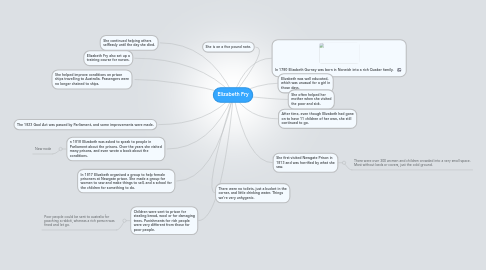Elizabeth Fry
by Rachel Shannon

1. She helped improve conditions on prison ships travelling to Australia. Passengers were no longer chained to ships.
2. There were no toilets, just a bucket in the corner, and little drinking water. Things we're very unhygenic.
3. Children were sent to prison for stealing bread, wool or for damaging trees. Punishments for rich people were very different from those for poor people.
3.1. Poor people could be sent to australia for poaching a rabbit, whereas a rich person was fined and let go.
4. In 1817 Elizabeth organised a group to help female prisoners at Newgate prison. She made a group for women to sew and make things to sell, and a school for the children for something to do.
5. n 1818 Elizabeth was asked to speak to people in Parliament about the prisons. Over the years she visited many prisons, and even wrote a book about the conditions.
5.1. New node
6. The 1823 Gaol Act was passed by Parliament, and some improvements were made.
7. Elizabeth Fry also set up a training course for nurses.
8. She continued helping others selflessly until the day she died.
9. She is on a five pound note.
10. In 1780 Elizabeth Gurney was born in Norwich into a rich Quaker family.
11. Elizabeth was well educated, which was unusual for a girl in those days.
12. She often helped her mother when she visited the poor and sick.
13. After time, even though Elizabeth had gone on to have 11 children of her own, she still continued to go.
14. She first visited Newgate Prison in 1813 and was horrified by what she saw.
14.1. There were over 300 women and children crowded into a very small space. Most without beds or covers, just the cold ground.


